
The Washington Blade is an LGBT newspaper in the Washington metropolitan area. The Blade is the oldest LGBT newspaper in the United States and third largest by circulation, behind the Philadelphia Gay News and the Gay City News of New York City. The Blade is often referred to as America's gay newspaper of record because it chronicled LGBT news locally, nationally, and internationally. The New York Times said the Blade is considered "one of the most influential publications written for a gay audience."

Metro Weekly is a free weekly magazine for the lesbian, gay, bisexual, and transgender (LGBTQ) community in Washington, D.C., United States. It was first published on May 5, 1994. Metro Weekly includes national and local news, interviews with LGBT leaders and politicians, community event calendars, nightlife guides, and reviews of the District's arts and entertainment scene. The website's Scene section has archived over 100,000 original photos from Washington's LGBT community events. Published every Thursday with copies available for pick-up at 500 locations throughout the metropolitan area, Metro Weekly is read by more than 45,000 people in D.C., Maryland, and Virginia.

LGBTQ+ Victory Fund, commonly shortened to Victory Fund, is an American political action committee dedicated to increasing the number of out LGBTQ+ public officials in the United States. Victory Fund is the largest LGBTQ+ political action committee in the United States and one of the nation's largest non-connected PACs.
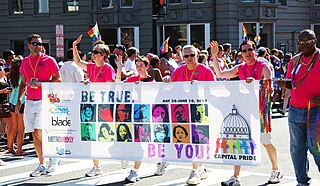
Capital Pride is an annual LGBT pride festival held in early June each year in Washington, D.C. It was founded as Gay Pride Day, a one-day block party and street festival, in 1975. In 1980 the P Street Festival Committee formed to take over planning. It changed its name to Gay and Lesbian Pride Day in 1981. In 1991, the event moved to the week prior to Father's Day. Financial difficulties led a new organization, One In Ten, to take over planning of the festival. Whitman-Walker Clinic (WWC) joined One In Ten as co-sponsor of the event in 1997, at which time the event's name was changed to Capital Pride. Whitman-Walker became the sole sponsor in 2000. But the healthcare organization came under significant financial pressures, and in 2008 turned over producing duties to a new organization, Capital Pride Alliance.
Velvet Nation was a gay dance event that took place at the Nation nightclub, formerly known as The Capitol Ballroom, located at 1015 Half Street, SE in Washington, D.C. The party name was derived from the venue name and "Velvet", an ode to the gay community. This event was hosted weekly on Saturday nights, 388 times over seven years, serving more than 741,000 patrons. The event ended when Nation closed on July 16, 2006. The club was forced to close because of eminent domain, and the land is now part of the redevelopment program being spurred by the new Nationals Park baseball stadium in the Navy Yard/Near Southeast neighborhood.
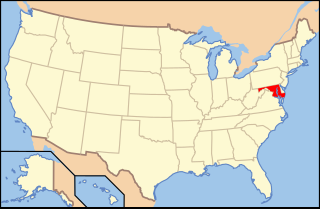
Equality Maryland (EQMD) was a non-profit organization formerly headquartered in Silver Spring, Maryland, now based in Baltimore. It was at the time, the largest organization in Maryland whose activities focused on advocacy and education with regard to LGBT social and political movements. Its mission included: the passage of laws prohibiting discrimination based on sexual orientation, gender expression, and gender identity; the expansion of Maryland's hate-crimes statute; the increase of domestic partner benefits; the legal recognition of same-sex marriage in Maryland and laws banning the practice of conversion therapy on minors. In 2016, the organization merged with FreeState Legal Project, to form FreeState Justice.
Cheryl Ann Spector was a well-known gay, lesbian, bisexual and transgender activist who lived in Arlington, Virginia.
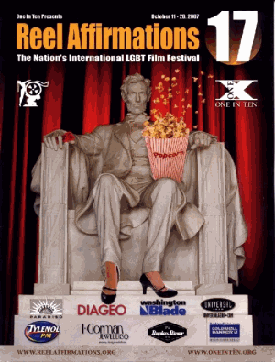
Reel Affirmations (RA) is a non-profit, all-volunteer LGBT film festival in Washington, D.C. Founded in 1991 and held every year in mid-October, as of 2011 Reel Affirmations was one of the largest LGBT film festivals in the United States. Baltimore's Gay Life newspaper called it "one of the top three films festivals for the entire LGBT community." A 2007 guidebook claims it was one of the largest LGBT film festivals in the world. A listing of LGBT film festivals claims it is the largest all-volunteer film festival in the world.
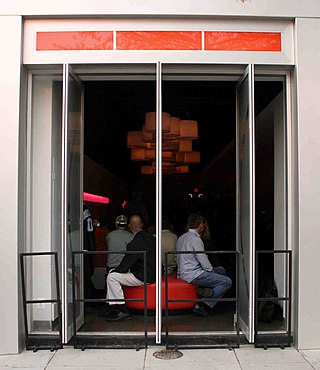
Halo was a gay bar located at 1435 P Street NW in the Logan Circle neighborhood of Washington, D.C., United States. Founded in 2004 by Ed Bailey and John Guggenmos, Halo first gained attention by being one of the few smoke-free gay bars in the city before its smoking ban was enacted in January 2007. Bailey and Guggenmos previously started other Washington D.C. LGBT clubs and events including the Velvet Nation party at Nation, Tracks, Millennium at the 9:30 Club, Ozone, and Cobalt. In 2007, Bailey and Guggenmos sold their remaining share of Halo to Babak Movahedi and opened Town Danceboutique on U Street, NW.

The Mautner Project is a national organization in the United States focused on improving the health of lesbians and other women who partner with women (WPW). It was founded in 1990 and is based in Washington, D.C. The organization provides direct services, engages in community outreach and health education campaigns, trains health care professionals to deliver culturally competent care, and raises awareness of lesbian and WPW health issues.

The Tucson Gay Museum maintains an extensive collection of archival materials, artifacts and graphic arts relating to the history of LGBT people in the United States, with a focus on the LGBT communities of Tucson, Arizona and Phoenix, Arizona. It became a member of the Arizona LGBTQIA+ Archives in 2020.

The LGBT community in Metro Detroit is centered in Ferndale, Michigan, as of 2007. As of 1997, many LGBT people live in Ferndale, Pleasant Ridge, and Royal Oak. Model D stated in 2007 that there are populations of gays and lesbians in some Detroit neighborhoods such as East English Village, Indian Village, Lafayette Park, and Woodbridge and that the concentration of gay bars in Detroit is "decentralized".

LGBT culture in Eugene, Oregon predates the Stonewall riots in New York in 1969, but that event coincided with organized efforts in Lane County, Oregon, to support and celebrate LGBTQ people. Even though Eugene has been rated on lists of cities friendly to LGBT populations, there are very few venues specifically for the LGBT community in the Eugene/Springfield metropolitan area.

Boston is a hub of LGBT culture and LGBT activism in the United States, with a rich history dating back to the election of the nation's first openly gay state representative, Elaine Noble, in 1974. The city is home to notable organizations like GLAD and Fenway Health, and it played a pivotal role in the legalization of same-sex marriage in Massachusetts. Various neighborhoods, including the South End, are known for their sizable LGBT populations, while numerous LGBT bars and entertainment venues offer spaces for community gatherings. Boston hosts an annual Pride Parade, and despite challenges, it continues to be a prominent event. Noteworthy organizations like The Welcoming Committee and the Boston Gay Men's Chorus contribute to the city's vibrant LGBT community, while The History Project preserves its rich history through an extensive LGBTQ archive.

New York City has been described as the gay capital of the world and the central node of the LGBTQ+ sociopolitical ecosystem, and is home to one of the world's largest and most prominent LGBTQ+ populations. Brian Silverman, the author of Frommer's New York City from $90 a Day, wrote the city has "one of the world's largest, loudest, and most powerful LGBT communities", and "Gay and lesbian culture is as much a part of New York's basic identity as yellow cabs, high-rise buildings, and Broadway theatre". LGBT travel guide Queer in the World states, "The fabulosity of Gay New York is unrivaled on Earth, and queer culture seeps into every corner of its five boroughs". LGBT advocate and entertainer Madonna stated metaphorically, "Anyways, not only is New York City the best place in the world because of the queer people here. Let me tell you something, if you can make it here, then you must be queer."
D.C.Black Pride is the first official black gay pride event in the United States and one of two officially recognized festivals for the African-American LGBT community. It is a program of the Center for Black Equity (CBE) and is also affiliated with the Capital Pride Alliance. DC Black Pride is held annually on Memorial Day weekend.
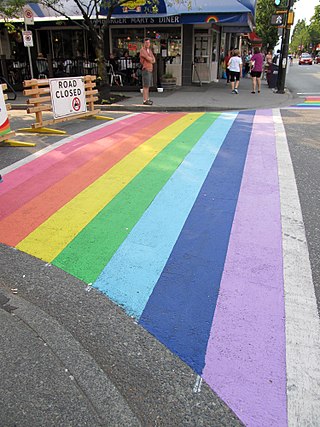
Vancouver's LGBT community is centered on Davie Village. Commercial Drive has historically acted as a gayborhood for the Vancouver lesbian community. Historically, LGBT people have also gathered in the Chinatown and Gastown neighborhoods. Former establishments include Dino's Turkish Baths, a gay bathhouse on Hastings, and the city's first drag bar, BJ's, on Pender Street.
LGBT culture in St. Louis is characterized by a long history of progressive activism as well as racial divisions and the city/county divide. St. Louis city is relatively liberal with multiple gayborhoods and several LGBT organizations. In 2019, Realtor.com dubbed St. Louis the 8th most LGBT-friendly city. Due to hostile legislation at the state level, however, it has become common for LGBT residents to relocate to Illinois for better protections and healthcare access.

In Washington, D.C., LGBT culture is heavily influenced by the U.S. federal government and the many nonprofit organizations headquartered in the city.
Kathleen Joan DeBold was an LGBT activist and advocate. The Washington Blade named her "Most Committed Female Activist" (2001) as well as a "Local Hero" (2005).
















